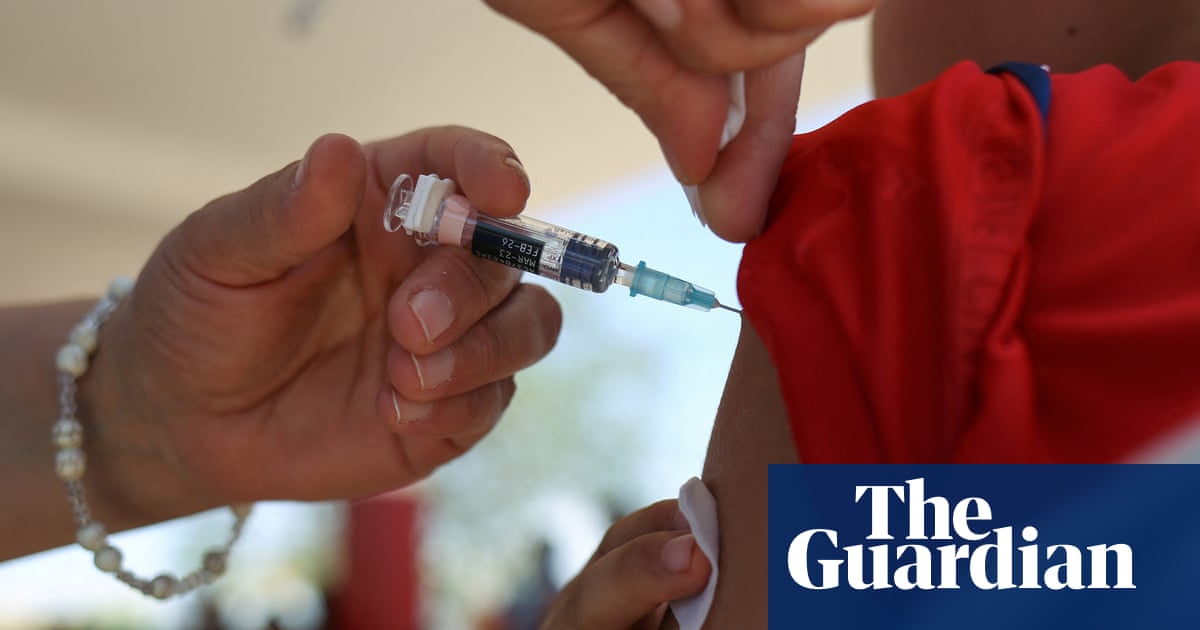Millions of children worldwide are at risk of lethal diseases because vaccine coverage has stalled or reversed amid persistent health inequalities and soaring levels of misinformation and hesitancy, the largest study of its kind has found.
Major progress in rolling out jabs to billions of children in all corners of the globe over the last five decades has prevented the deaths of 154 million children, according to an analysispublished in the Lancet.
But since 2010, progress has stalled or reversed in many countries. Measles vaccination rates have fallen in 100 of 204 countries, while coverage for at least one dose against diphtheria, tetanus, whooping cough, measles, polio or tuberculosis has declined in 21 of 36 high-income countries – including France, Italy, Japan, the UK and the US.
The reversal, further exacerbated by the disruption caused by the Covid-19 pandemic, has left millions of children vulnerable to preventable diseases and death, the authors of the study led by the University of Washington in Seattle said.
“Despite the monumental efforts of the past 50 years, progress has been far from universal,” said senior study author Dr Jonathan Mosser from the Institute forHealthMetrics and Evaluation at the University of Washington. “Large numbers of children remain under- and un-vaccinated.
“Routine childhood vaccinations are among the most powerful and cost-effective public health interventions available, but persistent global inequalities, challenges from the Covid pandemic, and the growth of vaccine misinformation and hesitancy have all contributed to faltering immunisation progress.
“These trends increase the risk of outbreaks of vaccine-preventable diseases, including measles, polio and diphtheria, underscoring the critical need for targeted improvements to ensure that all children can benefit from lifesaving immunisations.”
The findings should be taken as a clear warning that global immunisation targets for 2030 will not be met without urgent action to turn things around, researchers said.
Vaccine-preventable disease outbreaks pose a growing global risk. Increasing numbers of wild-type polio cases have been reported in Afghanistan and Pakistan, and there is a polio outbreak in Papua New Guinea, where less than half of the population is immunised.
In 2024, there was a nearly tenfold increase in measles infections recorded in Europe. The measles outbreak in the US reached more than 1,000 confirmed cases in 30 states in May 2025, surpassing the total number of cases in 2024.
The new analysis provides updated and extended global, regional and national estimates of annual routine childhood vaccination coverage from 1980 to 2023 in 204 countries and territories, using more than 1,000 data sources.
The past 50 years has seen huge progress, the study shows, with a 75% drop in the number of unvaccinated zero-dose children worldwide from 58.8 million in 1980 to 14.7 million in 2019.
However, this long-term progress masks recent challenges and substantial disparities. Since 2010, coverage gains slowed and, in some areas of the world, reversed.
For example, 21 of 36 high-income countries experienced declines in coverage for at least one of the recommended vaccines – including a 12% decline in first-dose measles vaccination in Argentina, and 8% and 6% declines in third-dose diphtheria-tetanus-pertussis (whooping cough) vaccination in Finland and Austria respectively.
Persistent health inequalities and the enduring effects of the Covid-19 pandemic are key factors, but vaccine misinformation and hesitancy is the biggest new factor behind the stalling of progress.
Lead author Dr Emily Haeuser, of the University of Washington, called for more concerted efforts to tackle vaccine misinformation and hesitancy.
“Successful vaccination programmes are built on understanding and responding to people’s beliefs, concerns and expectations,” she said.
Helen Bedford, professor of children’s health at University College London, who was not involved with the study, said the reasons for declining vaccine uptake were “numerous and complex”.
Action was necessary to tackle increasing social inequity, and misinformation about vaccine safety and necessity, as well as improving public confidence in vaccination programmes, she said.
“Vaccination remains one of our most powerful tools for protecting child health, but its continued success depends on sustained investment, equity, and public trust.”
